Sleeping Beauty: Full Text Story, Video in English Version, Life Lessons
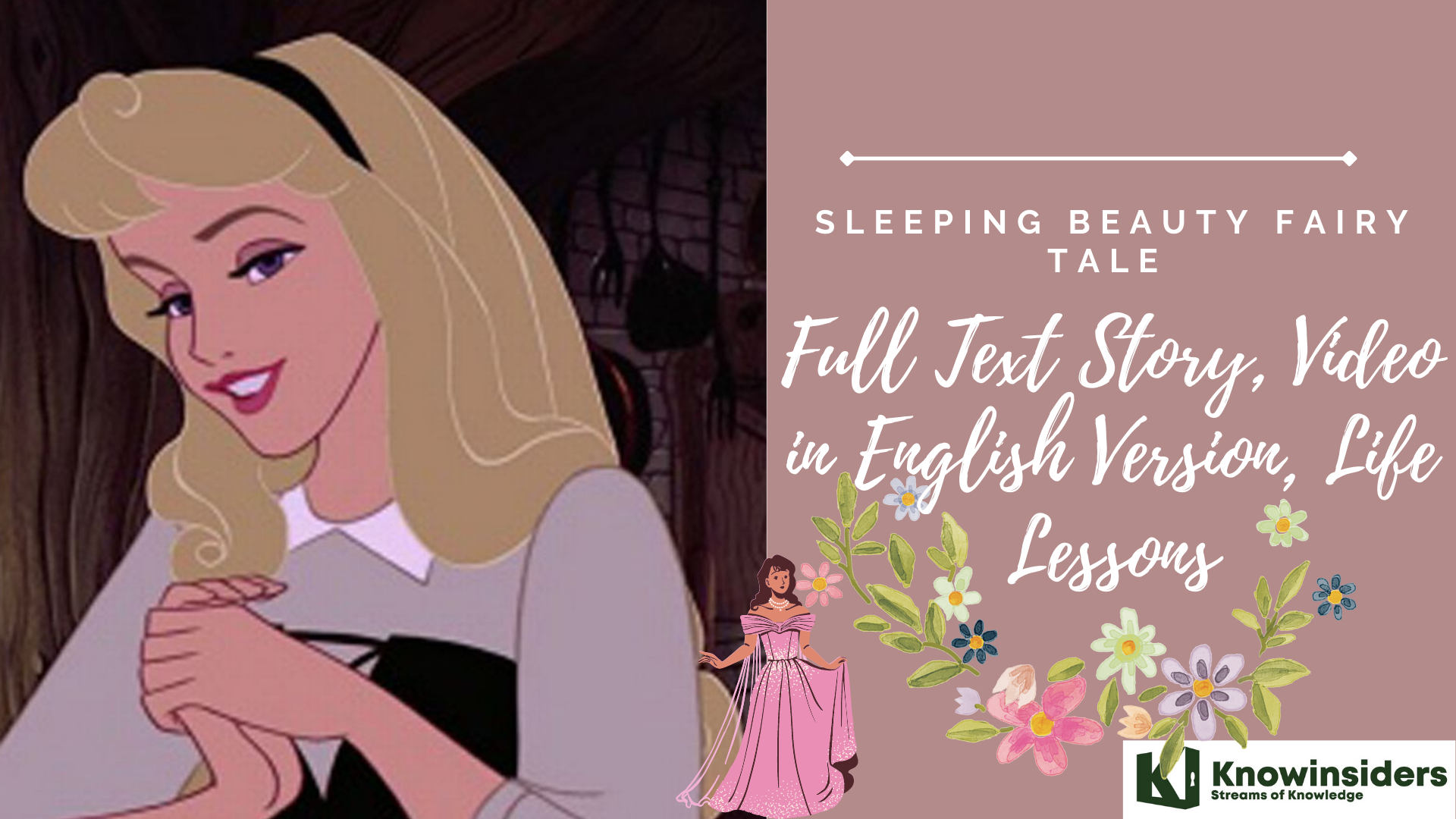 |
| Sleeping Beauty: Full Text Story, Video in English Version, Life Lessons |
Sleeping Beauty (French: La Belle au bois dormant), or Little Briar Rose (German: Dornröschen), also titled in English as The Sleeping Beauty in the Woods, is a classic fairy tale about a princess who is cursed to sleep for a hundred years by an evil fairy, to be awakened by a handsome prince at the end of them. The good fairy, realizing that the princess would be frightened if alone when she awakens, uses her wand to put every living person and animal in the palace asleep, to awaken when the princess does.
The earliest known version of the story is found in the narrative Perceforest, composed between 1330 and 1344. The tale was first published by Giambattista Basile in his collection of tales titled The Pentamerone (published posthumously in 1634). Basile's version was later adapted and published by Charles Perrault in Histoires ou contes du temps passé in 1697. The version that was later collected and printed by the Brothers Grimm was an orally transmitted version of the literary tale published by Perrault.
The Aarne-Thompson classification system for folktales classifies "Sleeping Beauty" as being a 410 tale type, meaning it includes a princess who is forced into an enchanted sleep and is later awakened reversing the magic placed upon her. The story has been adapted many times throughout history and has continued to be retold by modern storytellers throughout various media.
Sleeping Beauty: Video in English Version
Sleeping Beauty Origins
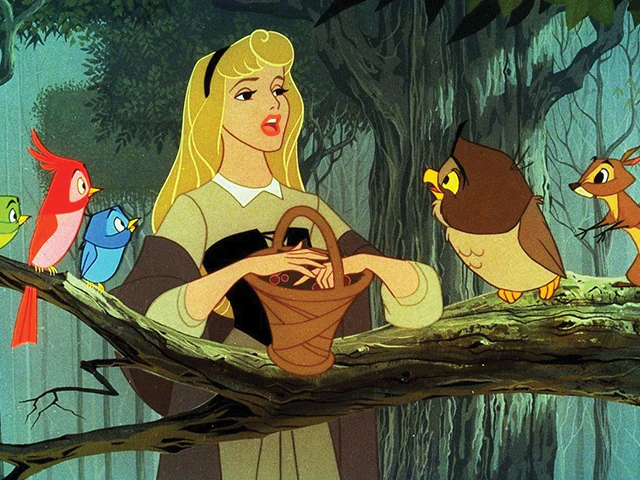 |
| Photo: Disney Movies |
Sleeping Beauty is the story most offered up as one that modern culture has “sanitized.” While fairytales by nature evolve through time (not necessarily making modern versions invalid) it is true that the versions of Sleeping Beauty popularized today are specifically cleaner—or at least, less “icky” than some of the earliest variations of the story.
For instance, Perceforest, a medieval courtly romance, is not strictly a Sleeping Beauty tale, but does include some of the earliest possible influences of the story. In it, “a princess named Zellandine falls in love with a man named Troylus. Her father sends him to perform tasks to prove himself worthy of her, and while he is gone, Zellandine falls into an enchanted sleep. Troylus finds her and impregnates her in her sleep; when their child is born, the child draws from her finger the flax that caused her sleep. She realizes from the ring Troylus left her that he was the father, and Troylus later returns to marry her.” (Jack Zipes, The Great Fairy Tale Tradition).
The flax that causes the princess’s slumber is also an element of Giambattista Basile’s version of the tale, Sun, Moon, and Talia. Found in his collection The Pentamerone (published in 1634 and 1636 by his sister after his death) Basile’s collection contained early variations of many other familiar fairy tales such as “Rapunzel,” “Puss in Boots,” and “Cinderella.” Basile’s collection would later become a great inspiration to both the Grimm Brothers and Charles Perrault.
In fact, Perrault’s version of Sleeping Beauty (included in his Histories ou Contes du temps passé, 1697) is basically an adaptation of Basile’s, the most notable change being the addition of the spinning wheel and the omission of the princess’s rape. However, he does include the second half of the story that revolves around the princess’s children and the threat of ogre cannibalism. Many scholars believe that these two halves of the story were separate folktales that Basile (and then Perrault) combined into one; despite the Grimm Brothers’ reputation for gore and disturbing imagery, their version omits this second half and is by far the tamest of the three.
Of course, like nearly all fairy tales, Sleeping Beauty’s history can be traced back even further to a number of myths and traditions. The second half of the story in particular is often connected to the medieval legend of Genevieve of Brabant, a classic tale of a wife falsely accused of infidelity. Sleeping Beauty also appears to have connection to the character of Brunhild, a figure of Norse and Germanic legend whose origins usually appear as a warrior queen, shieldmaiden, or Valkyrie. In the Prose Edda, the hero Sigurd comes upon a sleeping woman in armor; when he cuts away her armor, she—Brunhild—awakens. While the story has a less-than-happy ending, it should also be noted that Sigurd, at one point, must pass through a wall of flames—perhaps a similarity to the wall of thorns and briers in many of the Sleeping Beauty tales?
The history of the Brunhild tale is especially important, as the Grimm Brothers nearly rejected the Sleeping Beauty as being too French for their collection. However, it was the legend of Brunhild—one with Germanic history—that convinced them that the story must, indeed, have authentically German roots. This may also explain why the second half of tale, which has no German precedent, is not included in their version.
Over the years, Sleeping Beauty has become one of the most popular fairy tales, revisited in dozens of adaptations and retellings. Despite modern criticisms on the passiveness of its titular character, it can’t be denied that there is something particularly haunting and eerie about the idea of a beautiful princess asleep for a hundred years: an image that has captured our imaginations for even longer.
Variations
The princess's name has varied from one adaptation to the other. In Sun, Moon, and Talia, she is named Talia (Sun and Moon being her twin children). She has no name in Perrault's story but her daughter is called "Aurore". The Brothers Grimm named her "Briar Rose" in their 1812 collection. However, some translations of the Grimms' tale give the princess the name "Rosamond". Tchaikovsky's ballet and Disney's version named her Princess Aurora; however, in the Disney version, she is also called "Briar Rose" in her childhood, when she is being raised incognito by the good fairies. John Stejean named her "Rosebud" in TeleStory Presents.
Besides Sun, Moon, and Talia, Basile included another variant of this Aarne-Thompson type, The Young Slave, in his book, The Pentamerone. The Grimms also included a second, more distantly related one titled The Glass Coffin.
Italo Calvino included a variant in Italian Folktales. In his version, the cause of the princess's sleep is a wish by her mother. As in Pentamerone, the prince rapes her in her sleep and her children are born. Calvino retains the element that the woman who tries to kill the children is the king's mother, not his wife, but adds that she does not want to eat them herself, and instead serves them to the king. His version came from Calabria, but he noted that all Italian versions closely followed Basile's. In his More English Fairy Tales, Joseph Jacobs noted that the figure of the Sleeping Beauty was in common between this tale and the Romani tale The King of England and his Three Sons.
The hostility of the king's mother to his new bride is repeated in the fairy tale The Six Swans, and also features in The Twelve Wild Ducks, where the mother is modified to be the king's stepmother. However, these tales omit the attempted cannibalism.
Russian Romantic writer Vasily Zhukovsky wrote a versified work based on the theme of the princess cursed into a long sleep in his poem "Спящая царевна" ("The Sleeping Tsarevna" (ru)), published in 1832.
Sleeping Beauty: Plot summary
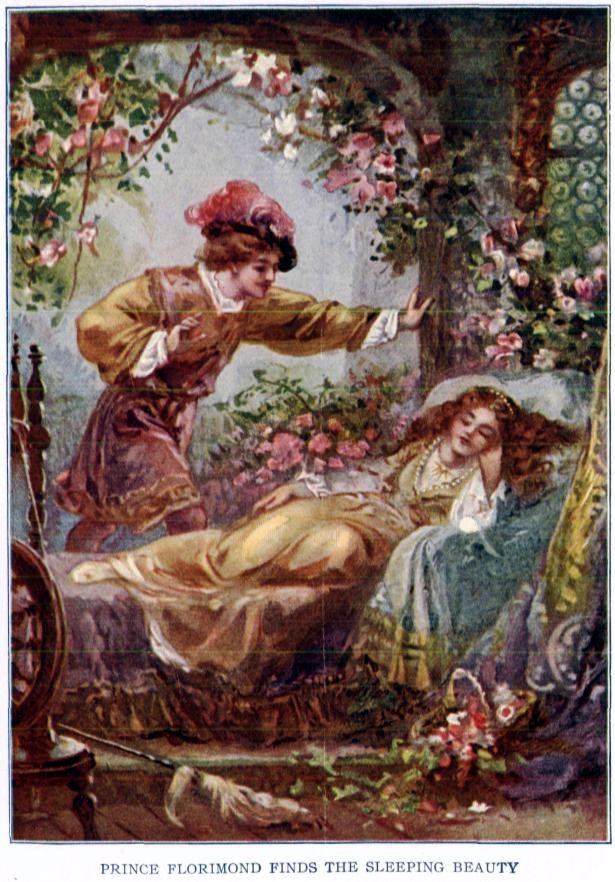 |
| Prince Florimund finds the Sleeping Beauty - Project Gutenberg etext 19993 |
Once upon a time a king and a queen lived and they wanted a child, but they could never have one. The situation started changing the day the queen met a frog that promised her that she would give birth to a girl in a year.
The royal couple got a daughter, and they were so happy that they decided to throw a big party. They invited the fairies that lived in their kingdom to the christening. The custom was that each fairy wishes something beautiful for the child.
Except for the mentioned fairies, everybody had forgotten an old one. Full of anger and hatred she went to the castle. The servants set up a table but they’ve only put 12 plates, and there were 13 fairies. The good fairies said their wishes and then the old one showed up.
She said a horrible curse and threatened that the girl would stab herself at the age of 15 on a spindle and die.
Everyone was left speechless. Then a good fairy said her spell. She could not undo the curse, but she could ease it. She wished that the girl instead of dying falls asleep and that after 100 years of sleep a prince will come and wake her up from the eternal sleep, and that only true love's kiss could rescue the girl.
Despite the fact that The sleeping beauty was not supposed to die the king got so scared that he order the kingdom to burn all of the spindles. When the princess turned 15, she was left alone for a while and started to investigate the castle.
Wandering through the castle, she ran into an old woman who was working with a spindle. She was curious and wanted to try it herself, and that’s how the curse came to life. The sleeping beauty fell asleep for 100 years.
The whole kingdom fell asleep with the princess. Everything stopped, and even the flies were frozen in time. The castle got surrounded by weeds, and the story of the sleeping princess began to spread around.
Brave princes came to wake her up, but they did not succeed in it because of the thick vegetation around the castle that took a few lives. After 100 years a brave young man came to the city and wanted to visit the castle everyone was talking about. His presence had a different effect on the vegetation that started moving and blossoming.
When he entered the castle, he saw servant sleeping and walking through the castle he finally found the princess. One look was enough for him to fall in love and his kiss woke her up. With the princess, the whole kingdom woke up, and the life started from where it stopped. The prince and princess lived happily ever after.
Characters Analysis
 |
| Photo: Disney |
Characters: The sleeping beauty, king and queen, prince, fairies
Sleeping Beauty - a beautiful young girl who is, like the other children of that age, very curious. In the end, it is saved by kindness and sincere love.
Prince - a young man, pure of heart and great courage. He managed to reach the castle and fall in love with a beautiful girl.
Good fairies - good women who want only the good and try to help as much as they can. They help to save the sleeping beauty.
Different versions of Sleeping Beauty story to read for your kids
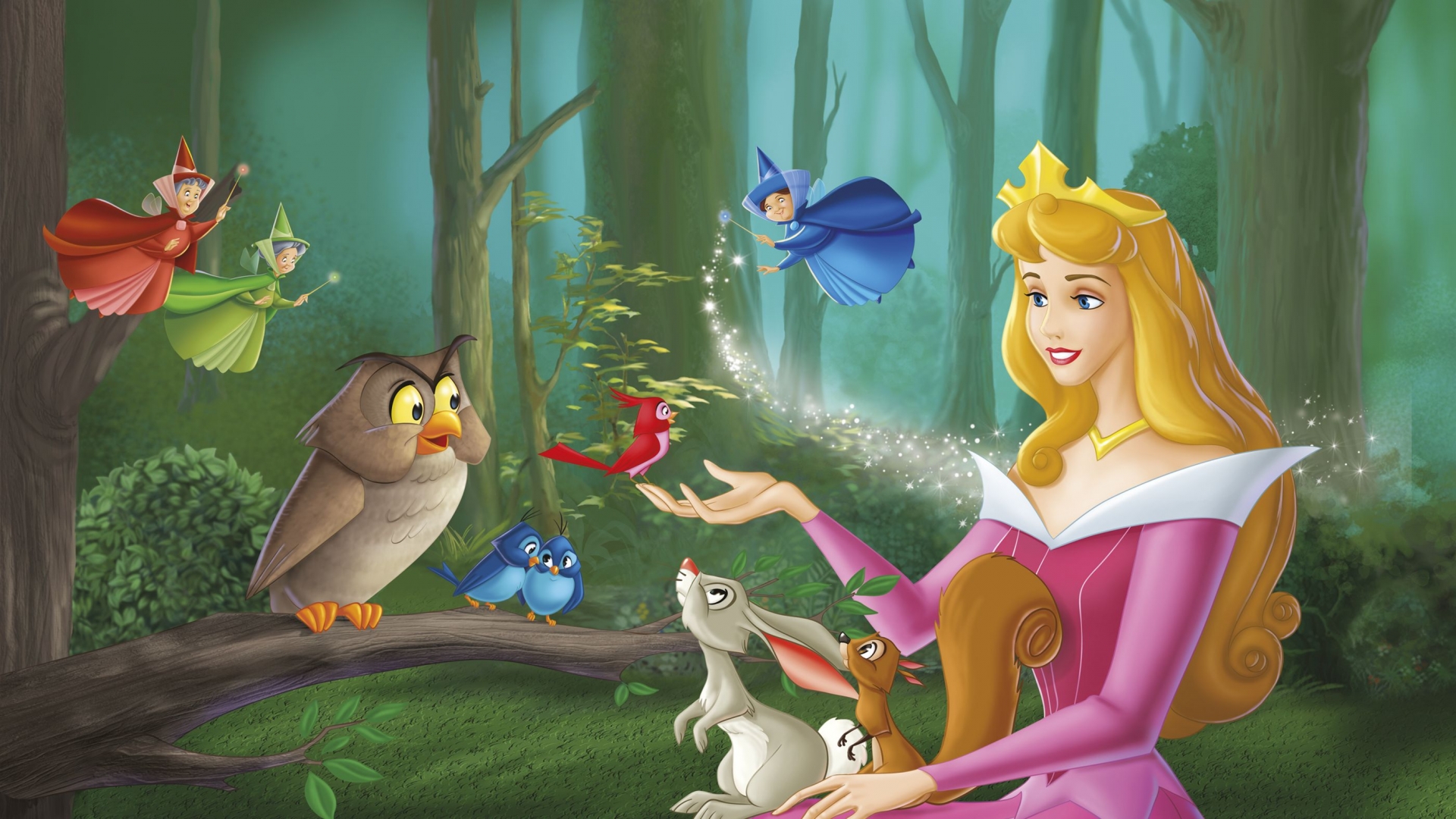 |
| Photo: Movies Anywhere |
Sun, Moon, and Talia - Giambattista Basile (Full Text)
There once lived a great lord, who was blessed with the birth of a daughter, whom he named Talia. He sent for the wise men and astrologers in his lands, to predict her future. They met, counseled together, and cast her horoscope, and at length they came to the conclusion that she would incur great danger from a splinter of flax. Her father therefore forbade that any flax, hemp, or any other material of that sort be brought into his house, so that she should escape the predestined danger.
One day, when Talia had grown into a young and beautiful lady, she was looking out of a window, when she beheld passing that way an old woman, who was spinning. Talia, never having seen a distaff or a spindle, was pleased to see the twirling spindle, and she was so curious as to what thing it was, that she asked the old woman to come to her. Taking the distaff from her hand, she began to stretch the flax. Unfortunately, Talia ran a splinter of flax under her nail, and she fell dead upon the ground. When the old woman saw this, she became frightened and ran down the stairs, and is running still.
As soon as the wretched father heard of the disaster which had taken place, he had them, after having paid for this tub of sour wine with casks of tears, lay her out in one of his country mansions. There they seated her on a velvet throne under a canopy of brocade. Wanting to forget all and to drive from his memory his great misfortune, he closed the doors and abandoned forever the house where he had suffered this great loss.
After a time, it happened by chance that a king was out hunting and passed that way. One of his falcons escaped from his hand and flew into the house by way of one of the windows. It did not come when called, so the king had one of his party knock at the door, believing the palace to be inhabited. Although he knocked for a length of time, nobody answered, so the king had them bring a vintner's ladder, for he himself would climb up and search the house, to discover what was inside. Thus he climbed up and entered, and looked in all the rooms, and nooks, and corners, and was amazed to find no living person there. At last he came to the salon, and when the king beheld Talia, who seemed to be enchanted, he believed that she was asleep, and he called her, but she remained unconscious. Crying aloud, he beheld her charms and felt his blood course hotly through his veins. He lifted her in his arms, and carried her to a bed, where he gathered the first fruits of love. Leaving her on the bed, he returned to his own kingdom, where, in the pressing business of his realm, he for a time thought no more about this incident.
Now after nine months Talia delivered two beautiful children, one a boy and the other a girl. In them could be seen two rare jewels, and they were attended by two fairies, who came to that palace, and put them at their mother's breasts. Once, however, they sought the nipple, and not finding it, began to suck on Talia's fingers, and they sucked so much that the splinter of flax came out. Talia awoke as if from a long sleep, and seeing beside her two priceless gems, she held them to her breast, and gave them the nipple to suck, and the babies were dearer to her than her own life. Finding herself alone in that palace with two children by her side, she did not know what had happened to her; but she did notice that the table was set, and food and drink were brought in to her, although she did not see any attendants.
In the meanwhile the king remembered Talia, and saying that he wanted to go hunting, he returned to the palace, and found her awake, and with two cupids of beauty. He was overjoyed, and he told Talia who he was, and how he had seen her, and what had taken place. When she heard this, their friendship was knitted with tighter bonds, and he remained with her for a few days. After that time he bade her farewell, and promised to return soon, and take her with him to his kingdom. And he went to his realm, but he could not find any rest, and at all hours he had in his mouth the names of Talia, and of Sun and Moon (those were the two children's names), and when he took his rest, he called either one or other of them.
Now the king's wife began to suspect that something was wrong from the delay of her husband while hunting, and hearing him name continually Talia, Sun, and Moon, she became hot with another kind of heat than the sun's. Sending for the secretary, she said to him, "Listen to me, my son, you are living between two rocks, between the post and the door, between the poker and the grate. If you will tell me with whom the king your master, and my husband, is in love, I will give you treasures untold; and if you hide the truth from me, you will never be found again, dead or alive." The man was terribly frightened. Greed and fear blinded his eyes to all honor and to all sense of justice, and he related to her all things, calling bread bread, and wine wine.
The queen, hearing how matters stood, sent the secretary to Talia, in the name of the king, asking her to send the children, for he wished to see them. Talia, with great joy, did as she was commanded. Then the queen, with a heart of Medea, told the cook to kill them, and to make them into several tasteful dishes for her wretched husband. But the cook was tender hearted and, seeing these two beautiful golden apples, felt pity and compassion for them, and he carried them home to his wife, and had her hide them. In their place he prepared two lambs into a hundred different dishes. When the king came, the queen, with great pleasure, had the food served.
The king ate with delight, saying, "By the life of Lanfusa, how tasteful this is"; or, "By the soul of my ancestors, this is good."
Each time she replied, "Eat, eat, you are eating of your own."
For two or three times the king paid no attention to this repetition, but at last seeing that the music continued, he answered, "I know perfectly well that I am eating of my own, because you have brought nothing into this house"; and growing angry, he got up and went to a villa at some distance from his palace, to solace his soul and alleviate his anger.
In the meanwhile the queen, not being satisfied of the evil already done, sent for the secretary and told him to go to the palace and to bring Talia back, saying that the king longed for her presence and was expecting her. Talia departed as soon as she heard these words, believing that she was following the commands of her lord, for she greatly longed to see her light and joy, knowing not what was preparing for her. She was met by the queen, whose face glowed from the fierce fire burning inside her, and looked like the face of Nero.
She addressed her thus, "Welcome, Madam Busybody! You are a fine piece of goods, you ill weed, who are enjoying my husband. So you are the lump of filth, the cruel bitch, that has caused my head to spin? Change your ways, for you are welcome in purgatory, where I will compensate you for all the damage you have done to me."
Talia, hearing these words, began to excuse herself, saying that it was not her fault, because the king her husband had taken possession of her territory when she was drowned in sleep; but the queen would not listen to her excuses, and had a large fire lit in the courtyard of the palace, and commanded that Talia should be cast into it.
The lady, perceiving that matters had taken a bad turn, knelt before the queen, and begged her to allow her at least to take off the garments she wore. The queen, not for pity of the unhappy lady, but to gain also those robes, which were embroidered with gold and pearls, told her to undress, saying, "You can take off your clothes. I agree." Talia began to take them off, and with every item that she removed she uttered a loud scream. Having taken off her robe, her skirt, the bodice, and her shift, she was on the point of removing her last garment, when she uttered a last scream louder than the rest. They dragged her towards the pile, to reduce her to lye ashes which would be used to wash Charon's breeches.
The king suddenly appeared, and finding this spectacle, demanded to know what was happening. He asked for his children, and his wife -- reproaching him for his treachery -- told him that she had had them slaughtered and served to him as meat. When the wretched king heard this, he gave himself up to despair, saying, "Alas! Then I, myself, am the wolf of my own sweet lambs. Alas! And why did these my veins know not the fountains of their own blood? You renegade bitch, what evil deed is this which you have done? Begone, you shall get your desert as the stumps, and I will not send such a tyrant-faced one to the Colosseum to do her penance!"
So saying, he commanded that the queen should be cast into the fire which she had prepared for Talia, and the secretary with her, because he had been the handle for this bitter play, and weaver of this wicked plot. He was going to do the same with the cook, whom he believed to be the slaughterer of his children, when the man cast himself at his feet, saying, "In truth, my lord, for such a deed, there should be nothing else than a pile of living fire, and no other help than a spear from behind, and no other entertainment than twisting and turning within the blazing fire, and I should seek no other honor than to have my ashes, the ashes of a cook, mixed up with the queen's. But this is not the reward that I expect for having saved the children, in spite of the gall of that bitch, who wanted to kill them and to return to your body that which was of your own body."
Hearing these words, the king was beside himself. He thought he was dreaming, and he could not believe what his own ears had heard. Therefore, turning to the cook, he said, "If it is true that you have saved my children, be sure that I will take you away from turning the spit, and I will put you in the kitchen of this breast, to turn and twist as you like all my desires, giving you such a reward as shall enable you to call yourself a happy man in this world."
While the king spoke these words, the cook's wife, seeing her husband's need, brought forth the two children, Sun and Moon, before their father. And he never tired at playing the game of three with his wife and children, making a mill wheel of kisses, now with one and then with the other. He gave a generous reward to the cook, he made him a chamberlain. He married Talia to wife; and she enjoyed a long life with her husband and her children, thus experiencing the truth of the proverb:
Those whom fortune favors
Find good luck even in their sleep.
The Sleeping Beauty in the Wood - Charles Perrault (Full Text)
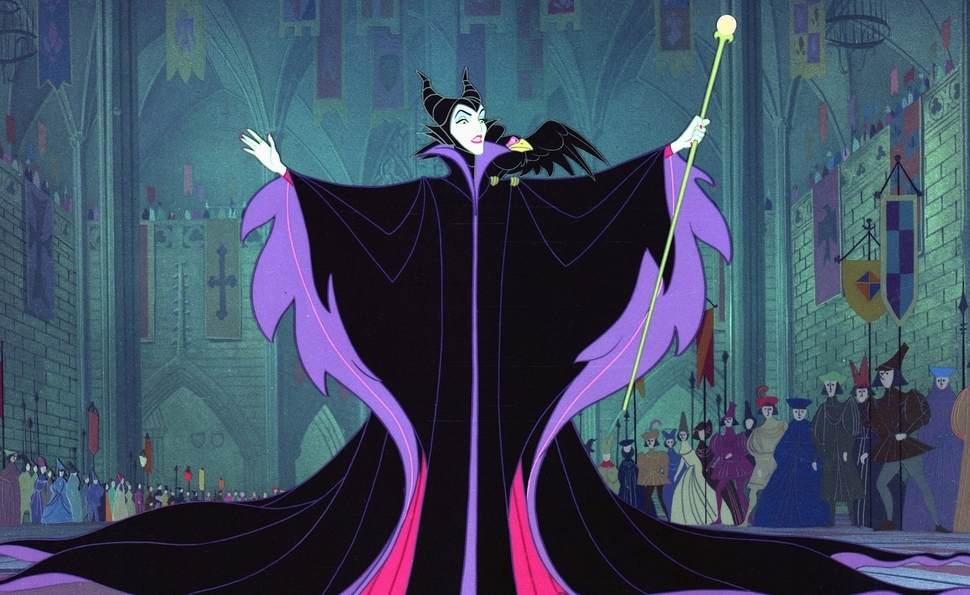 |
| Photo: Disney |
There were formerly a king and a queen, who were so sorry that they had no children; so sorry that it cannot be expressed. They went to all the waters in the world; vows, pilgrimages, all ways were tried, and all to no purpose.
At last, however, the queen had a daughter. There was a very fine christening; and the princess had for her godmothers all the fairies they could find in the whole kingdom (they found seven), that every one of them might give her a gift, as was the custom of fairies in those days. By this means the princess had all the perfections imaginable.
After the ceremonies of the christening were over, all the company returned to the king's palace, where was prepared a great feast for the fairies. There was placed before every one of them a magnificent cover with a case of massive gold, wherein were a spoon, knife, and fork, all of pure gold set with diamonds and rubies. But as they were all sitting down at table they saw come into the hall a very old fairy, whom they had not invited, because it was above fifty years since she had been out of a certain tower, and she was believed to be either dead or enchanted.
The king ordered her a cover, but could not furnish her with a case of gold as the others, because they had only seven made for the seven fairies. The old fairy fancied she was slighted, and muttered some threats between her teeth. One of the young fairies who sat by her overheard how she grumbled; and, judging that she might give the little princess some unlucky gift, went, as soon as they rose from table, and hid herself behind the hangings, that she might speak last, and repair, as much as she could, the evil which the old fairy might intend.
In the meanwhile all the fairies began to give their gifts to the princess. The youngest gave her for gift that she should be the most beautiful person in the world; the next, that she should have the wit of an angel; the third, that she should have a wonderful grace in everything she did; the fourth, that she should dance perfectly well; the fifth, that she should sing like a nightingale; and the sixth, that she should play all kinds of music to the utmost perfection.
The old fairy's turn coming next, with a head shaking more with spite than age, she said that the princess should have her hand pierced with a spindle and die of the wound. This terrible gift made the whole company tremble, and everybody fell a crying.
At this very instant the young fairy came out from behind the hangings, and spake these words aloud: "Assure yourselves, O King and Queen, that your daughter shall not die of this disaster. It is true, I have no power to undo entirely what my elder has done. The princess shall indeed pierce her hand with a spindle; but, instead of dying, she shall only fall into a profound sleep, which shall last a hundred years, at the expiration of which a king's son shall come and awake her."
The king, to avoid the misfortune foretold by the old fairy, caused immediately proclamation to be made, whereby everybody was forbidden, on pain of death, to spin with a distaff and spindle, or to have so much as any spindle in their houses. About fifteen or sixteen years after, the king and queen being gone to one of their houses of pleasure, the young princess happened one day to divert herself in running up and down the palace; when going up from one apartment to another, she came into a little room on the top of the tower, where a good old woman, alone, was spinning with her spindle. This good woman had never heard of the king's proclamation against spindles.
"What are you doing there, goody?" said the princess.
"I am spinning, my pretty child," said the old woman, who did not know who she was.
"Ha!" said the princess, "this is very pretty; how do you do it? Give it to me, that I may see if I can do so."
She had no sooner taken it into her hand than, whether being very hasty at it, somewhat unhandy, or that the decree of the fairy had so ordained it, it ran into her hand, and she fell down in a swoon.
The good old woman, not knowing very well what to do in this affair, cried out for help. People came in from every quarter in great numbers; they threw water upon the princess's face, unlaced her, struck her on the palms of her hands, and rubbed her temples with Hungary-water; but nothing would bring her to herself.
And now the king, who came up at the noise, bethought himself of the prediction of the fairies, and, judging very well that this must necessarily come to pass, since the fairies had said it, caused the princess to be carried into the finest apartment in his palace, and to be laid upon a bed all embroidered with gold and silver.
One would have taken her for a little angel, she was so very beautiful; for her swooning away had not diminished one bit of her complexion; her cheeks were carnation, and her lips were coral; indeed, her eyes were shut, but she was heard to breathe softly, which satisfied those about her that she was not dead. The king commanded that they should not disturb her, but let her sleep quietly till her hour of awaking was come.
The good fairy who had saved her life by condemning her to sleep a hundred years was in the kingdom of Matakin, twelve thousand leagues off, when this accident befell the princess; but she was instantly informed of it by a little dwarf, who had boots of seven leagues, that is, boots with which he could tread over seven leagues of ground in one stride. The fairy came away immediately, and she arrived, about an hour after, in a fiery chariot drawn by dragons.
The king handed her out of the chariot, and she approved everything he had done, but as she had very great foresight, she thought when the princess should awake she might not know what to do with herself, being all alone in this old palace; and this was what she did: she touched with her wand everything in the palace (except the king and queen) -- governesses, maids of honor, ladies of the bedchamber, gentlemen, officers, stewards, cooks, undercooks, scullions, guards, with their beefeaters, pages, footmen; she likewise touched all the horses which were in the stables, pads as well as others, the great dogs in the outward court and pretty little Mopsey too, the princess's little spaniel, which lay by her on the bed.
Immediately upon her touching them they all fell asleep, that they might not awake before their mistress and that they might be ready to wait upon her when she wanted them. The very spits at the fire, as full as they could hold of partridges and pheasants, did fall asleep also. All this was done in a moment. Fairies are not long in doing their business.
And now the king and the queen, having kissed their dear child without waking her, went out of the palace and put forth a proclamation that nobody should dare to come near it.
This, however, was not necessary, for in a quarter of an hour's time there grew up all round about the park such a vast number of trees, great and small, bushes and brambles, twining one within another, that neither man nor beast could pass through; so that nothing could be seen but the very top of the towers of the palace; and that, too, not unless it was a good way off. Nobody; doubted but the fairy gave herein a very extraordinary sample of her art, that the princess, while she continued sleeping, might have nothing to fear from any curious people.
When a hundred years were gone and passed the son of the king then reigning, and who was of another family from that of the sleeping princess, being gone a hunting on that side of the country, asked:
What those towers were which he saw in the middle of a great thick wood?
Everyone answered according as they had heard. Some said that it was a ruinous old castle, haunted by spirits.
Others, that all the sorcerers and witches of the country kept there their sabbath or night's meeting.
The common opinion was that an ogre lived there, and that he carried thither all the little children he could catch, that he might eat them up at his leisure, without anybody being able to follow him, as having himself only the power to pass through the wood.
The prince was at a stand, not knowing what to believe, when a very good countryman spake to him thus: "May it please your royal highness, it is now about fifty years since I heard from my father, who heard my grandfather say, that there was then in this castle a princess, the most beautiful was ever seen; that she must sleep there a hundred years, and should be waked by a king's son, for whom she was reserved."
The young prince was all on fire at these words, believing, without weighing the matter, that he could put an end to this rare adventure; and, pushed on by love and honor, resolved that moment to look into it.
Scarce had he advanced toward the wood when all the great trees, the bushes, and brambles gave way of themselves to let him pass through; he walked up to the castle which he saw at the end of a large avenue which he went into; and what a little surprised him was that he saw none of his people could follow him, because the trees closed again as soon as he had passed through them. However, he did not cease from continuing his way; a young and amorous prince is always valiant.
He came into a spacious outward court, where everything he saw might have frozen the most fearless person with horror. There reigned all over a most frightful silence; the image of death everywhere showed itself, and there was nothing to be seen but stretched-out bodies of men and animals, all seeming to be dead. He, however, very well knew, by the ruby faces and pimpled noses of the beefeaters, that they were only asleep; and their goblets, wherein still remained some drops of wine, showed plainly that they fell asleep in their cups.
He then crossed a court paved with marble, went up the stairs and came into the guard chamber, where guards were standing in their ranks, with their muskets upon their shoulders, and snoring as loud as they could. After that he went through several rooms full of gentlemen and ladies, all asleep, some standing, others sitting. At last he came into a chamber all gilded with gold, where he saw upon a bed, the curtains of which were all open, the finest sight was ever beheld -- a princess, who appeared to be about fifteen or sixteen years of age, and whose bright and, in a manner, resplendent beauty, had somewhat in it divine. He approached with trembling and admiration, and fell down before her upon his knees.
And now, as the enchantment was at an end, the princess awaked, and looking on him with eyes more tender than the first view might seem to admit of. "Is it you, my prince?" said she to him. "You have waited a long while."
The prince, charmed with these words, and much more with the manner in which they were spoken, knew not how to show his joy and gratitude; he assured her that he loved her better than he did himself; their discourse was not well connected, they did weep more than talk -- little eloquence, a great deal of love. He was more at a loss than she, and we need not wonder at it; she had time to think on what to say to him; for it is very probable (though history mentions nothing of it) that the good fairy, during so long a sleep, had given her very agreeable dreams. In short, they talked four hours together, and yet they said not half what they had to say.
In the meanwhile all the palace awaked; everyone thought upon their particular business, and as all of them were not in love they were ready to die for hunger. The chief lady of honor, being as sharp set as other folks, grew very impatient, and told the princess aloud that supper was served up. The prince helped the princess to rise; she was entirely dressed, and very magnificently, but his royal highness took care not to tell her that she was dressed like his great-grandmother, and had a point band peeping over a high collar; she looked not a bit less charming and beautiful for all that.
They went into the great hall of looking-glasses, where they supped, and were served by the princess's officers, the violins and hautboys played old tunes, but very excellent, though it was now above a hundred years since they had played; and after supper, without losing any time, the lord almoner married them in the chapel of the castle, and the chief lady of honor drew the curtains. They had but very little sleep -- the princess had no occasion; and the prince left her next morning to return to the city, where his father must needs have been in pain for him. The prince told him that he lost his way in the forest as he was hunting, and that he had lain in the cottage of a charcoal burner, who gave him cheese and brown bread.
The king, his father, who was a good man, believed him; but his mother could not be persuaded it was true; and seeing that he went almost every day a hunting, and that he always had some excuse ready for so doing, though he had lain out three or four nights together, she began to suspect that he was married, for he lived with the princess above two whole years, and had by her two children, the eldest of which, who was a daughter, was named Morning, and the youngest, who was a son, they called Day, because he was a great deal handsomer and more beautiful than his sister.
The queen spoke several times to her son, to inform herself after what manner he did pass his time, and that in this he ought in duty to satisfy her. But he never dared to trust her with his secret; he feared her, though he loved her, for she was of the race of the ogres, and the king would never have married her had it not been for her vast riches; it was even whispered about the court that she had ogreish inclinations, and that, whenever she saw little children passing by, she had all the difficulty in the world to avoid falling upon them. And so the prince would never tell her one word.
But when the king was dead, which happened about two years afterward, and he saw himself lord and master, he openly declared his marriage; and he went in great ceremony to conduct his queen to the palace. They made a magnificent entry into the capital city, she riding between her two children.
Soon after, the king went to make war with the Emperor Contalabutte, his neighbor. He left the government of the kingdom to the queen his mother, and earnestly recommended to her care his wife and children. He was obliged to continue his expedition all the summer, and as soon as he departed the queen mother sent her daughter-in-law to a country house among the woods, that she might with the more ease gratify her horrible longing.
Some few days afterward she went thither herself, and said to her clerk of the kitchen:
"I have a mind to eat little Morning for my dinner tomorrow."
"Ah! madam," cried the clerk of the kitchen.
"I will have it so," replied the queen (and this she spoke in the tone of an ogress who had a strong desire to eat fresh meat), "and will eat her with a sauce Robert."
The poor man, knowing very well that he must not play tricks with ogresses, took his great knife and went up into little Morning's chamber. She was then four years old, and came up to him jumping and laughing, to take him about the neck, and ask him for some sugar candy. Upon which he began to weep, the great knife fell out of his hand, and he went into the back yard, and killed a little lamb, and dressed it with such good sauce that his mistress assured him that she had never eaten anything so good in her life. He had at the same time taken up little Morning, and carried her to his wife, to conceal her in the lodging he had at the bottom of the courtyard.
About eight days afterward the wicked queen said to the clerk of the kitchen, "I will sup on little Day."
He answered not a word, being resolved to cheat her as he had done before. He went to find out little Day, and saw him with a little foil in his hand, with which he was fencing with a great monkey, the child being then only three years of age. He took him up in his arms and carried him to his wife, that she might conceal him in her chamber along with his sister, and in the room of little Day cooked up a young kid, very tender, which the ogress found to be wonderfully good.
This was hitherto all mighty well; but one evening this wicked queen said to her clerk of the kitchen, "I will eat the queen with the same sauce I had with her children."
It was now that the poor clerk of the kitchen despaired of being able to deceive her. The young queen was turned of twenty, not reckoning the hundred years she had been asleep; and how to find in the yard a beast so firm was what puzzled him. He took then a resolution, that he might save his own life, to cut the queen's throat; and going up into her chamber, with intent to do it at once, he put himself into as great fury as he could possibly, and came into the young queen's room with his dagger in his hand. He would not, however, surprise her, but told her, with a great deal of respect, the orders he had received from the queen mother.
"Do it; do it" (said she, stretching out her neck). "Execute your orders, and then I shall go and see my children, my poor children, whom I so much and so tenderly loved," for she thought them dead ever since they had been taken away without her knowledge.
"No, no, madam" (cried the poor clerk of the kitchen, all in tears); "you shall not die, and yet you shall see your children again; but then you must go home with me to my lodgings, where I have concealed them, and I shall deceive the queen once more, by giving her in your stead a young hind."
Upon this he forthwith conducted her to his chamber, where, leaving her to embrace her children, and cry along with them, he went and dressed a young hind, which the queen had for her supper, and devoured it with the same appetite as if it had been the young queen. Exceedingly was she delighted with her cruelty, and she had invented a story to tell the king, at his return, how the mad wolves had eaten up the queen his wife and her two children.
One evening, as she was, according to her custom, rambling round about the courts and yards of the palace to see if she could smell any fresh meat, she heard, in a ground room, little Day crying, for his mamma was going to whip him, because he had been naughty; and she heard, at the same time, little Morning begging pardon for her brother.
The ogress presently knew the voice of the queen and her children, and being quite mad that she had been thus deceived, she commanded next morning, by break of day (with a most horrible voice, which made everybody tremble), that they should bring into the middle of the great court a large tub, which she caused to be filled with toads, vipers, snakes, and all sorts of serpents, in order to have thrown into it the queen and her children, the clerk of the kitchen, his wife and maid; all whom she had given orders should be brought thither with their hands tied behind them.
They were brought out accordingly, and the executioners were just going to throw them into the tub, when the king (who was not so soon expected) entered the court on horseback (for he came post) and asked, with the utmost astonishment, what was the meaning of that horrible spectacle.
No one dared to tell him, when the ogress, all enraged to see what had happened, threw herself head foremost into the tub, and was instantly devoured by the ugly creatures she had ordered to be thrown into it for others. The king could not but be very sorry, for she was his mother; but he soon comforted himself with his beautiful wife and his pretty children.
Moral
Many a girl has waited long
For a husband brave or strong;
But I'm sure I never met
Any sort of woman yet
Who could wait a hundred years,
Free from fretting, free from fears.
Now, our story seems to show
That a century or so,
Late or early, matters not;
True love comes by fairy-lot.
Some old folk will even say
It grows better by delay.
Yet this good advice, I fear,
Helps us neither there nor here.
Though philosophers may prate
How much wiser 'tis to wait,
Maids will be a sighing still --
Young blood must when young blood will!
Little Brier-Rose - Jacob and Wilhelm Grimm (Full Text)
A king and queen had no children, although they wanted one very much. Then one day while the queen was sitting in her bath, a crab crept out of the water onto the ground and said, "Your wish will soon be fulfilled, and you will bring a daughter into the world." And that is what happened.
The king was so happy about the birth of the princess that he held a great celebration. He also invited the fairies who lived in his kingdom, but because he had only twelve golden plates, one had to be left out, for there were thirteen of them.
The fairies came to the celebration, and as it was ending they presented the child with gifts. The one promised her virtue, the second one gave beauty, and so on, each one offering something desirable and magnificent. The eleventh fairy had just presented her gift when the thirteenth fairy walked in. She was very angry that she had not been invited and cried out, "Because you did not invite me, I tell you that in her fifteenth year, your daughter will prick herself with a spindle and fall over dead."
The parents were horrified, but the twelfth fairy, who had not yet offered her wish, said, "It shall not be her death. She will only fall into a hundred-year sleep." The king, hoping to rescue his dear child, issued an order that all spindles in the entire kingdom should be destroyed.
The princess grew and became a miracle of beauty. One day, when she had just reached her fifteenth year, the king and queen went away, leaving her all alone in the castle. She walked from room to room, following her heart's desire. Finally she came to an old tower. A narrow stairway led up to it. Being curious, she climbed up until she came to a small door. There was a small yellow key in the door. She turned it, and the door sprang open. She found herself in a small room where an old woman sat spinning flax. She was attracted to the old woman, and joked with her, and said that she too would like to try her hand at spinning. She picked up the spindle, but no sooner did she touch it, than she pricked herself with it and then fell down into a deep sleep.
At that same moment the king and his attendants returned, and everyone began to fall asleep: the horses in the stalls, the pigeons on the roof, the dogs in the courtyard, the flies on the walls. Even the fire on the hearth flickered, stopped moving, and fell asleep. The roast stopped sizzling. The cook let go of the kitchen boy, whose hair he was about to pull. The maid dropped the chicken that she was plucking. They all slept. And a thorn hedge grew up around the entire castle, growing higher and higher, until nothing at all could be seen of it.
Princes, who had heard about the beautiful Brier-Rose, came and tried to free her, but they could not penetrate the hedge. It was as if the thorns were firmly attached to hands. The princes became stuck in them, and they died miserably. And thus it continued for many long years.
Then one day a prince was traveling through the land. An old man told him about the belief that there was a castle behind the thorn hedge, with a wonderfully beautiful princess asleep inside with all of her attendants. His grandfather had told him that many princes had tried to penetrate the hedge, but that they had gotten stuck in the thorns and had been pricked to death.
"I'm not afraid of that," said the prince. "I shall penetrate the hedge and free the beautiful Brier-Rose."
He went forth, but when he came to the thorn hedge, it turned into flowers. They separated, and he walked through, but after he passed, they turned back into thorns. He went into the castle. Horses and colorful hunting dogs were asleep in the courtyard. Pigeons, with their little heads stuck under they wings, were sitting on the roof. As he walked inside, the flies on the wall, the fire in the kitchen, the cook and the maid were all asleep. He walked further. All the attendants were asleep; and still further, the king and the queen. It was so quiet that he could hear his own breath.
Finally he came to the old tower where Brier-Rose was lying asleep. The prince was so amazed at her beauty that he bent over and kissed her. At that moment she awoke, and with her the king and the queen, and all the attendants, and the horses and the dogs, and the pigeons on the roof, and the flies on the walls. The fire stood up and flickered, and then finished cooking the food. The roast sizzled away. The cook boxed the kitchen boy's ears. And the maid finished plucking the chicken. Then the prince and Brier-Rose got married, and they lived long and happily until they died.
What is the moral of the story?The moral of sleeping beauty is that sometimes life and growning up presents risks that no matter how hard you try to avoid them you can't and that love conqueors all. • The moral of this story is; obey your parents. They are kind towards their children so always they think good for children. • To love your relations and eep them happy. • Never hurt humanity. • Never give up and keep trying. This story tells us how to cope up with difficulties. As brave prince entered into the palace with great courage. He never lost his mental power that he could not do . He tried with his full courage. As looking at prince's bravery, sincerity, never ever give up and loose your will power. Hurdles come but have a power to deal them. • Sincereity, seriousness and beleif can win the every race of life. • True feelings are rare and special, not everyonecan have it. it becomes the model for others to look up to, and the glue that holds a kingdom together. • Support and love of parents are the source of getting daring thing. Behind the support of family, you can defeat and dismiss every situation, evil. |
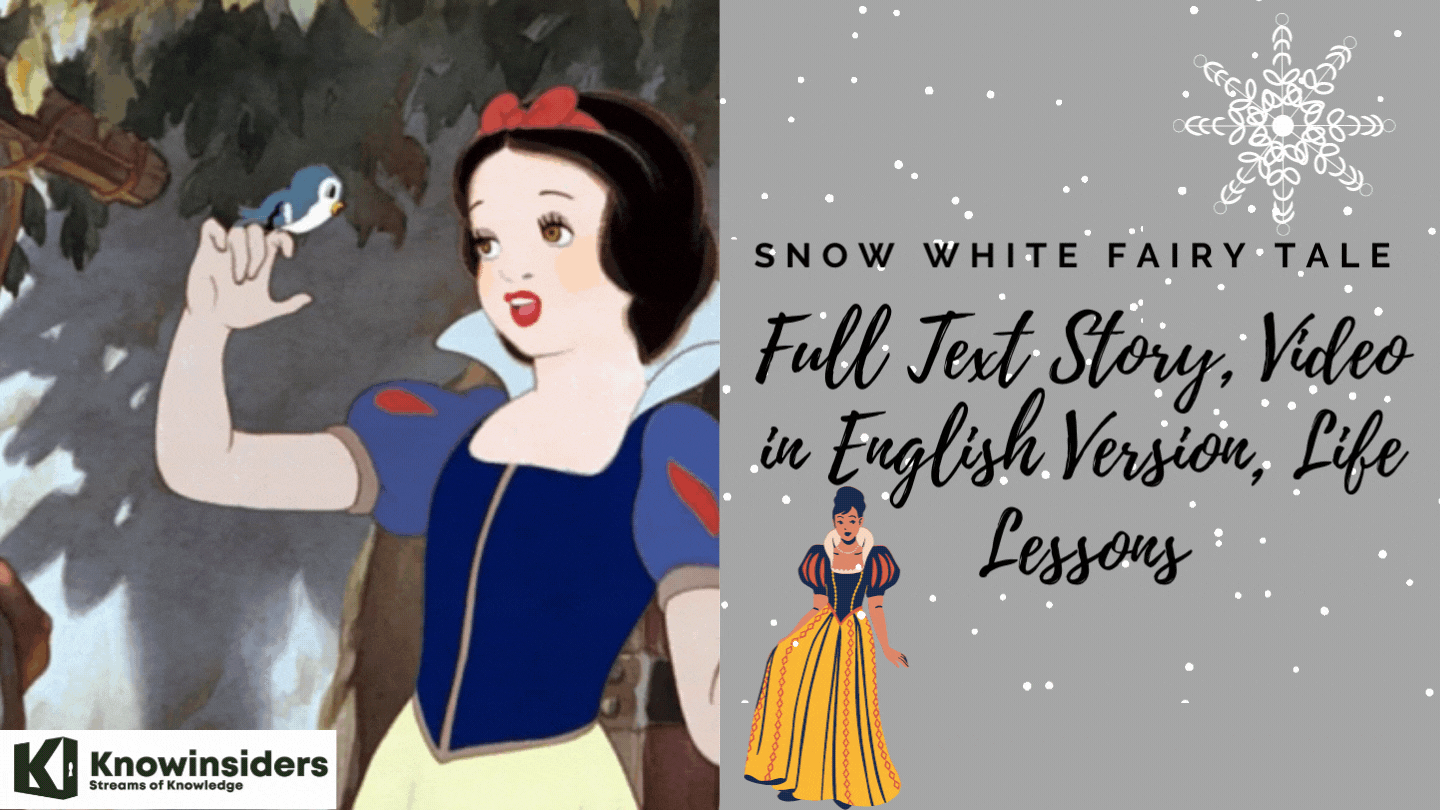 Snow White and the Seven Dwarfs: Full Text Story, Video in English Version, Life Lessons Snow White and the Seven Dwarfs: Full Text Story, Video in English Version, Life Lessons Reading or watching the best fairy tale of Snow White and the Seven Dwarfs: Here are the full-text story, beautiful pictures, and the best video ... |
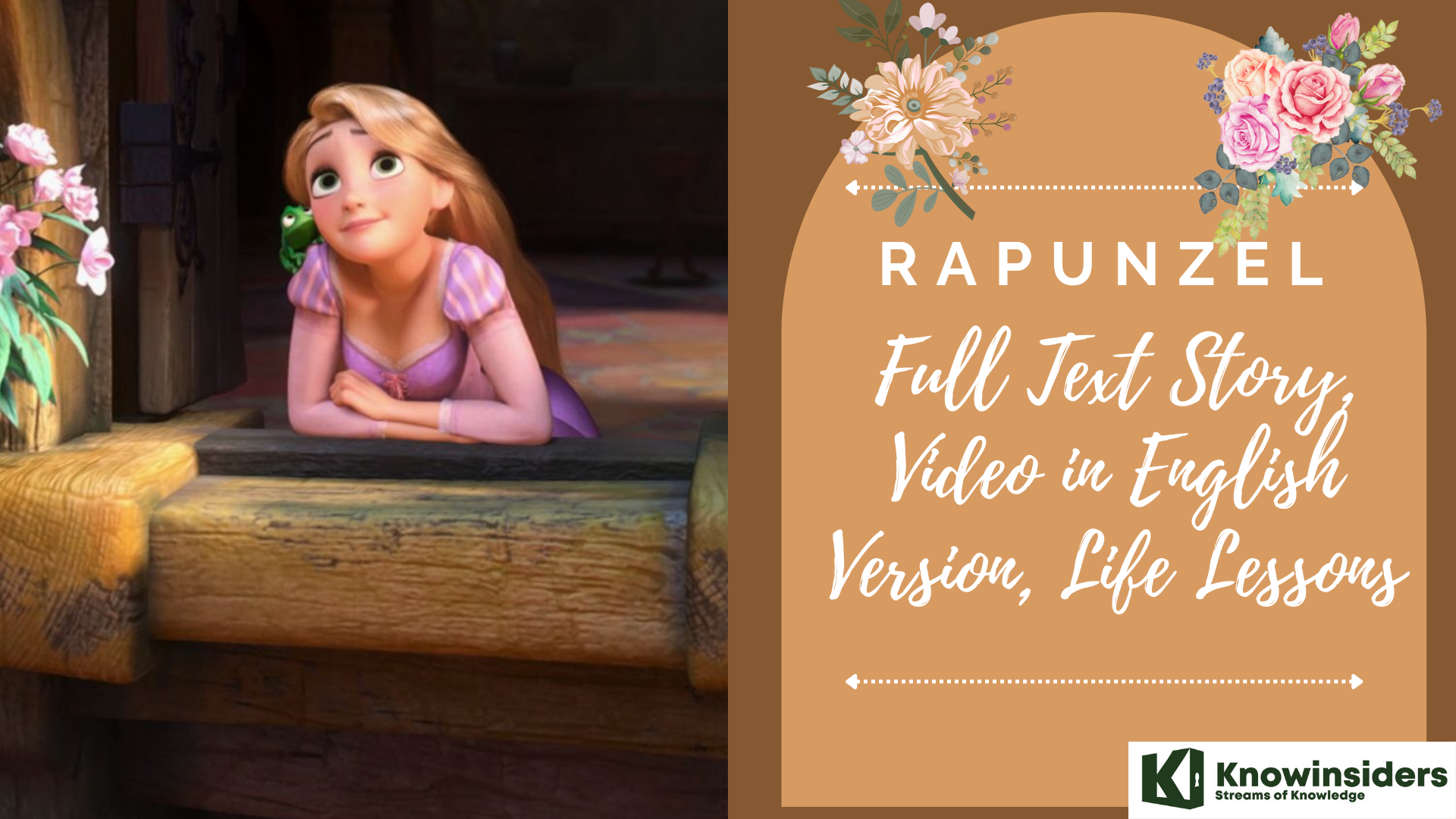 Rapunzel FairyTale: Full Text Story, Video in English Version, Life Lessons Rapunzel FairyTale: Full Text Story, Video in English Version, Life Lessons Reading or watching the best fairy tale of Rapunzel: Here are the full-text story, beautiful pictures, and the best video in the English version. |
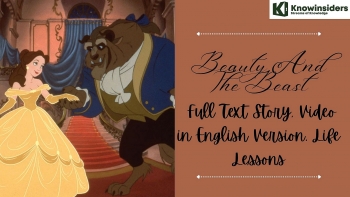 Beauty And The Beast FairyTale: Full Text Story, Video in English Version, Life Lessons Beauty And The Beast FairyTale: Full Text Story, Video in English Version, Life Lessons Reading or watching the best fairy tale of Beauty And The Beast: Here are the full-text story, beautiful pictures, and the best video in the ... |
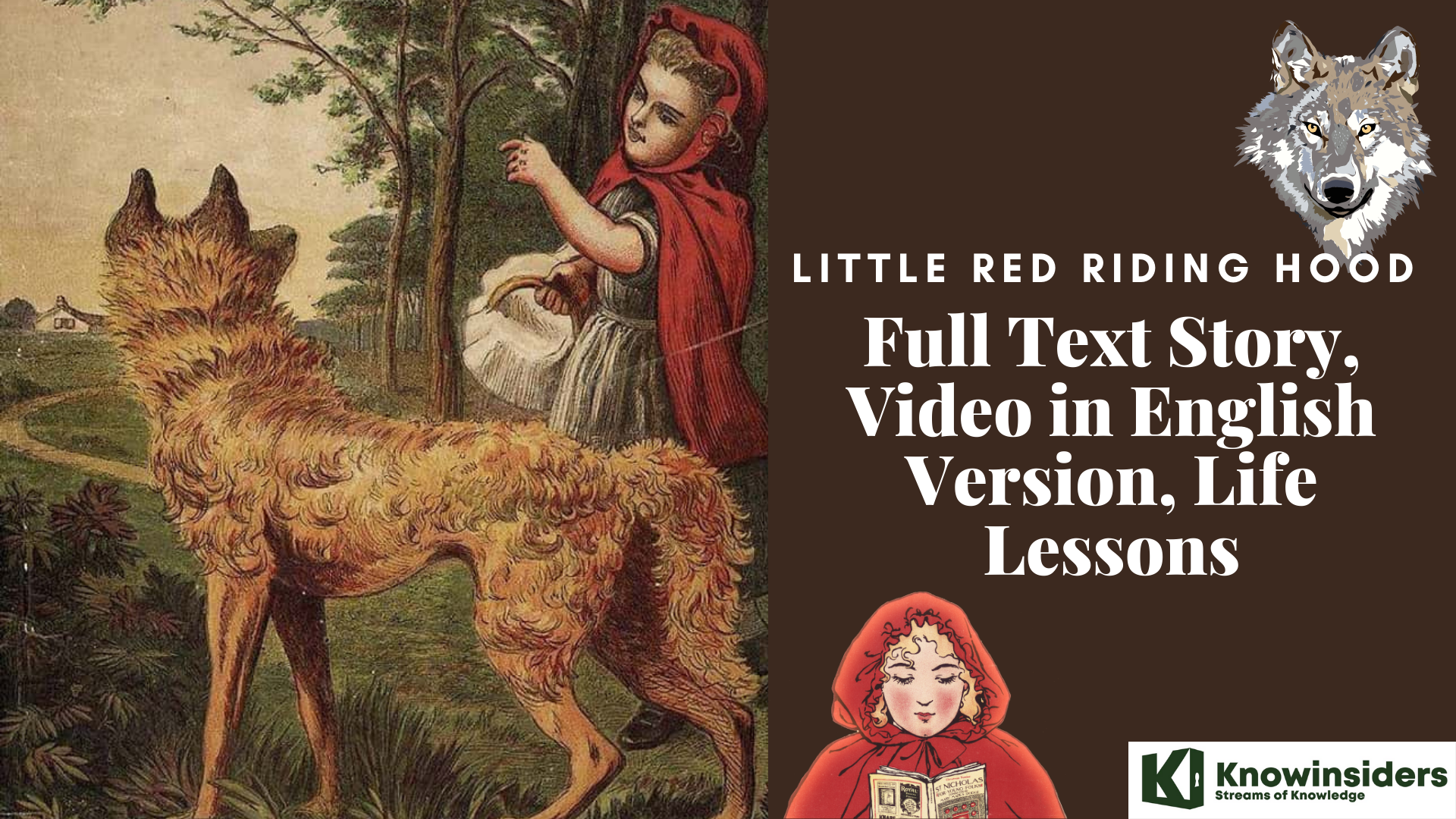 Little Red Riding Hood FairyTale: Full Text Story, Video in English Version and Life Lessons Little Red Riding Hood FairyTale: Full Text Story, Video in English Version and Life Lessons Reading or watching the best fairy tale of Little Red Riding Hood: Here are the full-text story, beautiful pictures, and the best video in the ... |
 Cinderella FairyTale: Full Text Story, Video in English Version, Life Lessons Cinderella FairyTale: Full Text Story, Video in English Version, Life Lessons Reading or watching the best fairy tale of Cinderella (The Little Glass Slipper): Here are the full text story, beautiful pictures and best video in ... |


























